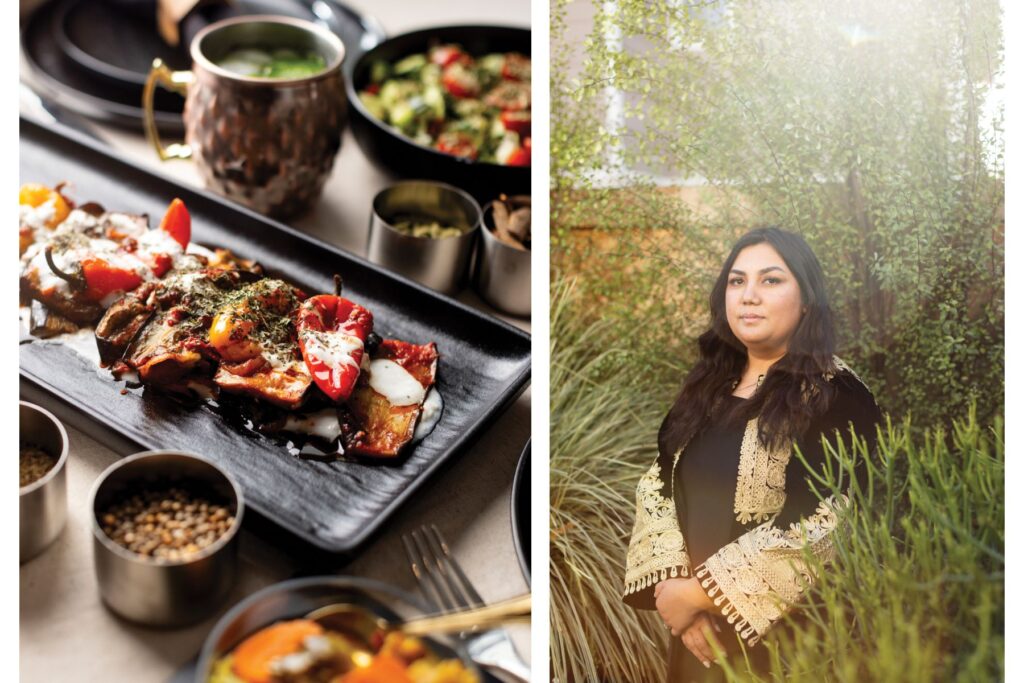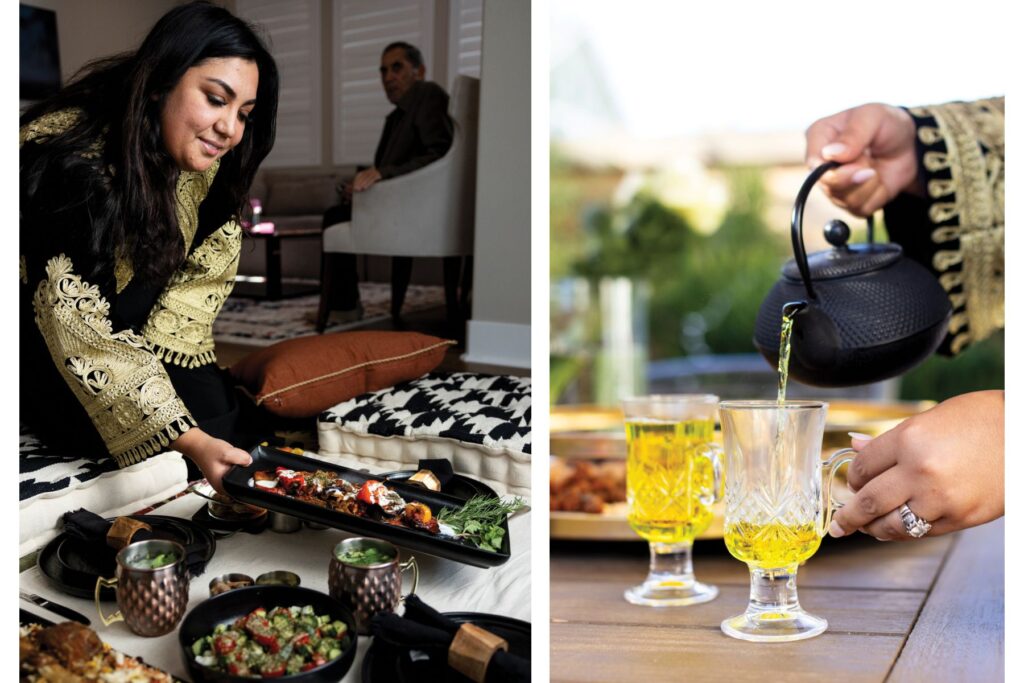
Afghan Refugee Brings Cultural Cooking to San Luis Obispo County
How cooking elevates the importance of identity, the strength of family and the meaning of home.
Story by Scott Lewis
Photography by Ruby Wallau
When the withdrawal of U.S. and allied forces from Afghanistan began in 2021, the country suffered what Sophia Zekria, her peers and many international organizations refer to as “the collapse of Afghanistan.” The sudden departure of the U.S. military, two decades after American troops had invaded the country in response to the September 11 terror attacks carried out by Al Qaeda, left Sophia’s home country in a significant humanitarian and political crisis.
That year, Sophia lived with her family in Kabul, the capital city of Afghanistan. Her daughter Arsh was then just two years old, and her husband Abdullah Hazrati worked as a translator and security guard for the U.S. Army. In August, the U.S. and allied forces largely left Afghanistan, leading to the rapid and chaotic takeover of the country by the Taliban, a terrorist group.
Abdullah and anyone associated with him were in immediate danger, as he was considered an enemy of the Taliban for his work with the U.S. Army. While many Afghans fled to the airport, Abdullah’s American contacts, who were helping him and his family find refuge, told them to stay put. But as days went by, the fear and pressure to escape grew, so the family attempted to run to the airport. “There were so many people,” recalls Sophia. “We couldn’t even get to the door. So, we waited and thought it would calm down. We continued to wait for four nights, sleeping on the ground and feeling hopeless.”
With no relief in sight, they returned home. That same night, a bomb blast rocked the airport. The last flight left, and evacuations ceased; the airport was locked. At home, Sophia, Abdullah and Arsh hid, then moved from one house to another to avoid the Taliban. Finally they received word that they’d be evacuated. Twenty days later, the three boarded a plane, with no idea where they were headed. Since their departure on Sept. 24, 2021, they haven’t been back.

They arrived in Abu Dhabi, the capital of the United Arab Emirates, where they lived eight months confined in a refugee camp. In April 2022, they were again ushered onto an airplane — this time to the States. Just outside our nation’s capital in Virginia, they learned about SLO4Home, a coalition of religious organizations, veterans and active-duty military members and community activists from San Luis Obispo County that helps refugees establish new lives on the Central Coast.
“We collaborate with refugees in rebuilding their lives to foster self-sufficiency and connection, to build stronger, more compassionate and diverse California Central Coast communities. We incorporated as a 501©(3) nonprofit two years ago and have now helped three Afghan families, three Syrian families and two Ukrainian families start to find new lives in our area after escaping from their war-torn homelands,” says Lauren Brown, who co-founded the organization with Dr. Vance Rodgers. SLO4Home works with nine refugee agencies in conjunction with the U.S. Department of State to help resettle refugees from around the world. One of them called the Church World Service, a non-denominational organization, has done this since the end of World War II.
Sophia, Abdullah and Arsh are the first family SLO4Home assisted. Eager for a settled life, the family boarded yet another plane in May 2022 and landed in San Luis Obispo, 7,500 miles from home. “I had no idea what to expect when I got on the plane,” says Sophia. “I had no idea someone would be so kind to pick us up from the airport. From there we stayed for three weeks at volunteer Philip Bailey’s home. He is like family to me now, like a dad. My daughter calls him her grandpa.” (Philip is Dean Emeritus of Cal Poly’s College of Science & Mathematics.)
It took time to settle in. “Neither my husband or I had driver’s licenses, or a car, for almost six months. I remember putting all of my groceries in the stroller, and walking and walking to get home with all of the stuff,” Sophia recalls. “Abdullah was going to work on a donated bike. He worked at Shalimar, and Farmers Insurance. It got easier because SLO4Home helped us so much in every way: transportation, education, work. And they helped us find a home. I don’t think I would have made it without them.”

When Abdullah was injured in a bike accident, Sophia stepped up her work schedule. While working at Sephora, it dawned on her that she should be doing what she loves: cooking and sharing her food. To gain experience in the food industry, she began working with Delicious by Debbie Dugan, a catering company in San Luis Obispo. That led to more catering jobs, including work with Garrett Morris who runs Sichuan Kitchen SLO. “I was impressed by both Sophia and Abdullah’s work ethic while working with them under Debbie,” says Garrett, “I asked them to help me with my event later that September.”
Through KOR, her home chef business, Sophia is eager to showcase Afghan national dishes like kabuli pulao, a pilaf dish with core ingredients of steamed rice mixed with caramelized carrots and raisins plus a marinated protein — either lamb, chicken or beef.
Other dishes include aushak, a dumpling typically filled with leeks, onions or chives and served with creamy garlic yogurt and a hearty tomato-based sauce. Mantu is another dumpling-like dish of seasoned beef and onions tucked into a tender wrapper and topped with an herby yogurt sauce. And there’s bolani, a fried, stuffed flatbread usually composed of a mix of potatoes, cilantro and peppers, but it can also be filled with pumpkin, red lentils, leeks or spiced onion, and eaten with yogurt.
“There is no Afghan food [here],” Sophia says. “I can introduce that. And when I see people and share where I’m from, the only thing they think of is war. Why not share my beautiful culture? Afghan people are so kind, so beautiful. It’s not all war.”
Sophia has since catered close to 10 private parties, including for her mentor Susan Dressler, a SLO resident and retired Vice President of Cuesta College. Susan met Sophia when volunteering for SLO4Home. “Susan gave me love when I was feeling hopeless. She came and praised my talent. I had my first catered party at her house.”
“Sophia is incredibly talented, ambitious,” says Susan. “She catered my birthday for 22 family members who came in from across the country. And she impressed them all.” Guests enjoyed borani kadoo, a rich pumpkin dish, as well as borani banjan, eggplant simmered in tomato sauce.

One of Sophia’s most cherished events was hosted by Philip, who first took in her family. “In August [Sophia] prepared an Afghan meal for the Cal Poly women’s basketball team,” shares Philip. This was a very full circle moment for Sophia, who shared her immigration story as the event guests enjoyed her food. “She and her husband talked with the team about their escape from Afghanistan, and Sophia talked about the things Afghan women can no longer do. For example, Sophia played basketball in Afghanistan … not possible anymore. Sophia certainly made an impression.”
She explains, “It meant a lot to me to be there, because I played basketball for six years. I had dreams of playing in the Olympics, but where I’m from, that was very much looked down upon in society. I would have been picked at, no matter what. It was a path for boys, not for girls. I yearned for the freedom. I wanted to wear what I wanted, to be with my friends and not be judged.”
America has afforded Sophia and her family those opportunities. And they’ve returned the help they received. “When we first got started [with SLO4Home], we were novices,” Susan admits. “Together with Sophia, and Abdullah and Arsh, we figured out the model — how best to support the families moving here.”
Sophia continues to attend Cuesta College on the culinary track, which she hopes will grow her food business. She adds, “I want to introduce my culture and passion through food, to show how a woman from Afghanistan won’t miss an opportunity. I’ll take it all in, even with any bad feedback. I’ll do what it takes to get better.”
Lamb Kabuli Pulao
Serves 4
Recipe by Sophia Zekria
INGREDIENTS
3 cups sella basmati rice
3½ cups water for boiling, 3 cups for cooking, plus more for soaking and rinsing rice
½ cup vegetable oil
1 large onion, thinly sliced
1½ pounds stewing lamb, cubed
4 cloves garlic, chopped
Salt, to taste
1 teaspoon ground cinnamon
1 teaspoon ground cumin
1 teaspoon ground cardamom
½ cup raisins
½ cup carrots, shredded
¼ cup almonds, slivered
¼ cup pistachios, chopped
2 teaspoons char masala
PREPARATION
Step 1
Rinse rice and soak in water for 30 minutes. Drain. In large pot, boil 3½ cups water. Add salt and soaked rice. Boil until rice is cooked but not completely soft (about 80 percent cooked). Drain and set aside.
Step 2
In a pressure cooker or Instapot heat vegetable oil over medium heat. Add sliced onion, sauté until golden brown. Add lamb and garlic to onions and cook for 30 seconds. Season with salt, cinnamon, cumin and cardamom. Add 3 cups of water. Cook for 25 minutes on high pressure until meat is fork tender.
Step 3
Preheat oven to 350 degrees F. In large ovenproof dish, layer half of the partially cooked rice, followed by half the lamb and onion mixture and half of raisins, carrots, almonds and pistachios. Add half the char masala. Repeat again finishing with a layer of rice on top. Cover dish tightly with aluminum foil. Bake for 30−40 minutes until rice is fully cooked. Once done, give rice a gentle toss, serve a layer of rice on each dish plate topped with meat and remainder of rice. Add carrots and raisins, garnish with almonds and pistachios. Serve hot.

